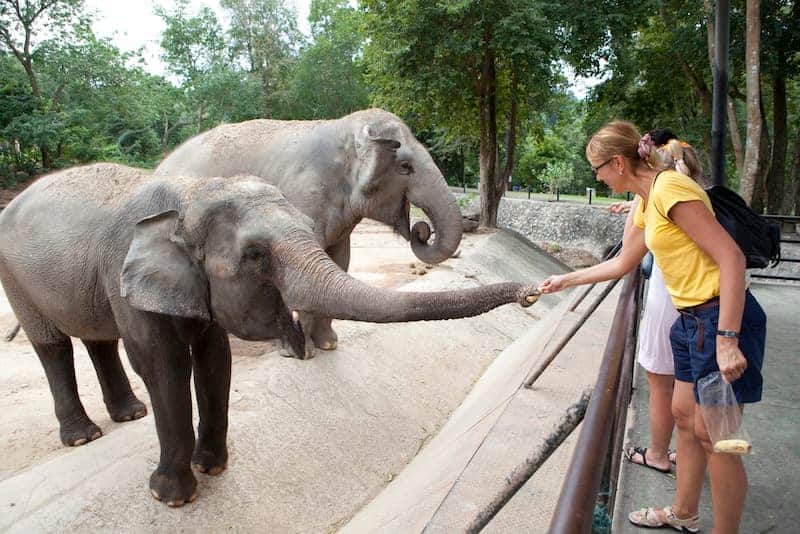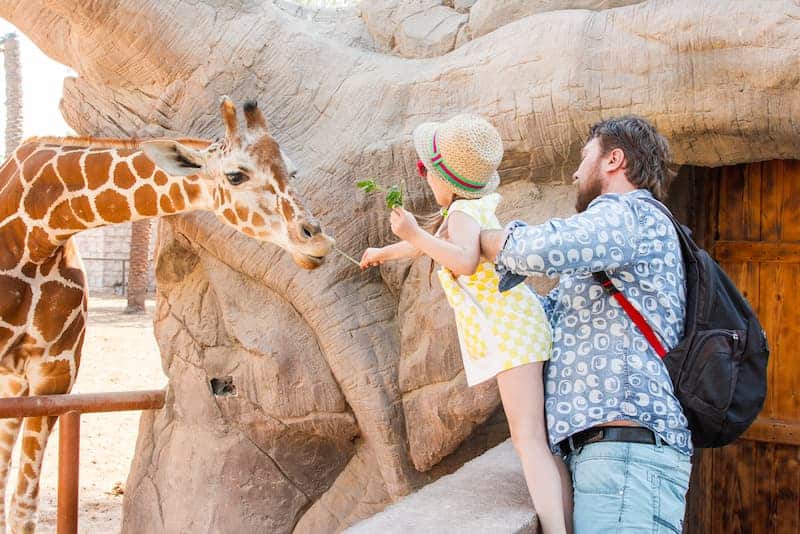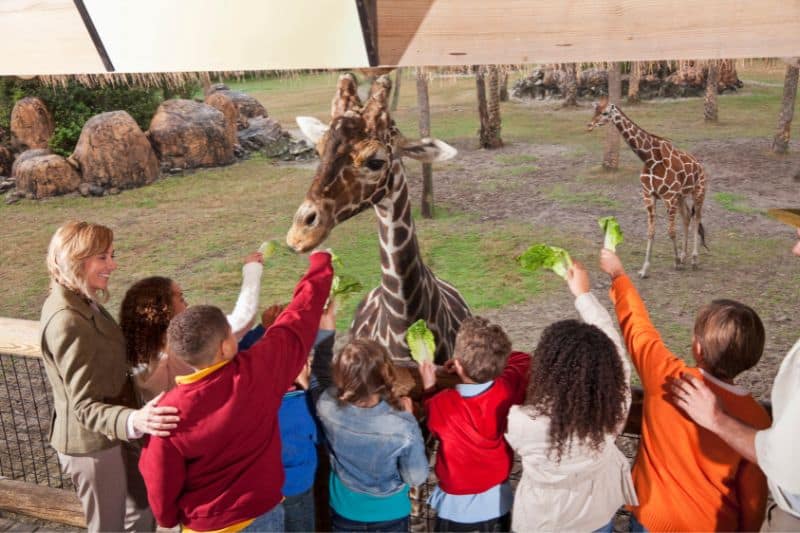I will be honest: I’ve always enjoyed visiting zoos ever since childhood. I mean, who on this planet doesn’t love to behold magnificent animals such as lions, elephants, and giraffes from a close distance?
A visit to the zoo was one of the things that made my childhood days truly beautiful!
However, as I grew older and started to understand the concept of captivity and wildlife conservation, one question began to haunt me every time I visited a zoo: are zoos ethical?
This question had lingered in my mind for years until recently when I decided to dig into the issue to discover the answer.
Read: 20+ Things You Should Know Before Going Off-Grid
Keep reading for the findings!
Are Zoos Immoral?
Whether zoos are ethical or not is a highly debated topic, with arguments from both sides. And while you’d think that either of the sides would clearly be more convincing, this doesn’t seem to be the case, as you’re about to notice.
However, looking at both sides of the debate, it’s clear that whether zoos are ethical depends on how the individual zoo is managed and run, what animals are kept in it, and many other factors.
Some zoos might be ethical (well, to some degree), whereas others, in the real sense, aren’t, with financial gains serving as the primary drive for putting animals in captivity.
So, when it comes to whether zoos are moral or not, the answer is not a straightforward yes or no. It depends on multiple factors, such as the zoo’s purpose, the animals’ living conditions, and their overall well-being.
To avoid being biased when answering the ethical question, we need to take a closer look at both sides of the debate.

The Positive Side of the Debate
Many people believe that the concept of zoos when executed with the right intentions and practices, can be inherently good.
Here’s the positive side of the argument:
1. Education and Awareness
On one side of the debate, the idea behind zoos isn’t vile, after all, and one of the reasons they think so is that zoos play a crucial role in educating the public about wildlife conservation. This offers a unique opportunity for people to learn about animals they might never see in the wild.
Walk into any zoo, and you’ll find informational signs next to the animal exhibits, educational talks by zookeepers, and interactive programs that allow visitors to get up close with certain animals while learning about their habitats and behaviors.
This kind of education can be especially beneficial for children who may not have access to such information otherwise.
2. Conservation Efforts
Another argument in support of zoos is that they are actively involved in conservation efforts for endangered species. Some zoos participate in breeding programs, reintroduction projects, and other initiatives to preserve and protect vulnerable animal populations.
Some zoos have well-designed exhibits and educational programs that allow visitors to gain a deeper understanding of the need for conservation efforts.
A case in point is the San Diego Zoo. According to the information provided on the website, this Zoo is a non-profit wildlife conservation center whose main motivation is to inspire a new passion for nature in its visitors.
This center uses its global reach to educate millions about species conservation, and among their recent conservation efforts have been directed to the endangered Lord Howe Island Stick insect.
3. Research Opportunities
Zoos also offer unique research opportunities that can significantly contribute to our understanding of animal behavior, biology, and health.
With animals in captivity providing consistent access and observation, researchers can study various aspects of wild animals that would otherwise be difficult or impossible to observe in the wild.
Moreover, this research can provide valuable insights into how we can better support these animals, even those living in the wild, and improve their well-being.
Take the Royal Burgers Zoo as an example. In this zoo, much scientific research has been conducted, leading to the publication of a whopping 21 scientific articles, including an article detailing the nighttime and daytime swimming behaviors of eagle rays, among others.
4. Assisting Overburdened Wild Environments
As the world’s population grows, so does our environmental impact. When wild habitats are destroyed or fragmented, animal populations suffer and may struggle to find enough resources to survive.
Zoos can play a role in alleviating this pressure by providing safe havens for animals that might otherwise be at risk in the wild.
The Bornean Sun Bear Conservation Centre works alongside zoos to rehabilitate, and sometimes house sun bears affected by deforestation. There have been up to 43 sun bears that have benefited from this initiative — and that’s just one of the many examples.
5. Zoos Keep Some Species Safer Than the Wild
While we all love to see animals in their natural habitats, sometimes, that might not be the best option for certain species. In cases where a species is critically endangered or facing threats such as poaching and habitat destruction, zoos can provide a much safer environment for these animals to thrive.
In some cases, zoos have successfully saved certain animal species that have gone extinct in the wild, such as the Przewalski’s horse and California condor.
Additionally, zoos can also provide specialized care and medical treatment for animals that may be injured or ill in the wild.
6. Zoos Increase Lifespan of Some Species
In a recent study that involved 50 mammals, it was established that up to 80% of them lived longer in captivity than in the wild. In fact, some animals are so rare that living in a zoo is actually better for survival and population growth compared to the wild.
7. Zoos Create Employment
While this may sound one-sided, it’s still a valid point to consider. Running a zoo requires a lot of work and personnel from various fields, such as animal care, education, research, veterinary services, maintenance, and administration.
This creates job opportunities for individuals passionate about wildlife conservation and enables them to use their skills to make a positive impact on the lives of animals.

The Negative Side of the Debate
On the other hand, there are valid arguments against zoos that raise some ethical concerns. Some of the main points include:
1. A Disrupted Ecosystem
The ecosystem is, per se, an intricate system, and every living organism plays a crucial role in maintaining balance. When animals are taken out of their natural habitats and placed in zoos, it disrupts this balance, affecting not just the animal removed but also other species that might depend on it.
There is also the ethical question of whether humans truly have the right to decide which species should thrive or struggle, live or die.
2. The Stress of Stagnation
Critics of the zoo system assert that nothing can replace the freedom and complexity of the wild. Captivity, even in the most enriched environment, is still captivity.
The stress caused by confinement, lack of space, and sterile enclosure environments can lead to physical and psychological health issues for the animals.
Some animals exhibit signs of ‘zoochosis,’ a range of abnormal and repetitive behaviors believed to be caused by stress and boredom. I guess we’ve all seen the endless pacing of caged tigers, lionesses, leopards, or bears.
3. Zoos Shorten the Lifespan of Some Animals
While zoos can increase the lifespan of some animals, they may shorten that of others. For instance, studies have found that elephants in captivity die at a much younger age than their wild counterparts.
The stress and limited space in captivity take a toll on these large, social creatures who are used to roaming vast distances and living in complex family structures.
In fact, a study found that African Elephants in captivity have an average lifespan of 17 years, much shorter than the 56 years of their wild counterpart. That’s a significant cut in lifespan, and the sad part is that most zoos that actually have elephants don’t have the space for them to roam, which might make the problem worse.
4. Breeding for Life in Captivity
Another point of contention is that not all zoo breeding programs have successful release into the wild. There are questions about how many animals actually return to their natural habitats and whether they can adapt to their native environments. Critics argue that such programs may prioritize the zoos’ display needs over the animals’ long-term welfare.
5. The Hidden Costs of Conservation
The function of zoos as conservation centers also faces criticism amid allegations of greenwashing — using the guise of conservation to cover unsavory practices. In some cases, animals suffer from overpopulation or inbreeding depression, which can be exacerbated in small, enclosed spaces and limited gene pools.
Finding the Middle Ground
So, what’s the answer? Should we continue to support zoos or do away with them altogether? The truth is that both sides of the debate have valid points, and it’s not a simple black-and-white issue.
Perhaps the key to finding a solution lies in striking a balance between conservation and animal welfare concerns. It is essential for zoos to constantly evaluate their practices, prioritize the animals’ well-being, and ensure that they are meeting all ethical standards.
Read: How To Dispose of Broken TV Sustainably?
Furthermore, it’s crucial to support zoos that are actively involved in conservation efforts and have a strong track record of successfully reintroducing animals into the wild.
Of course, for animals like elephants that suffer harsh repercussions in captivity, it’s better to exempt them from zoos altogether and focus on protecting their natural habitats.
Ultimately, it is up to us as individuals to educate ourselves on both sides of the argument and make informed decisions about which zoos we choose to support. With the right approach, zoos can continue to play a vital role in wildlife conservation and education while also ensuring the well-being of the animals in their care.






